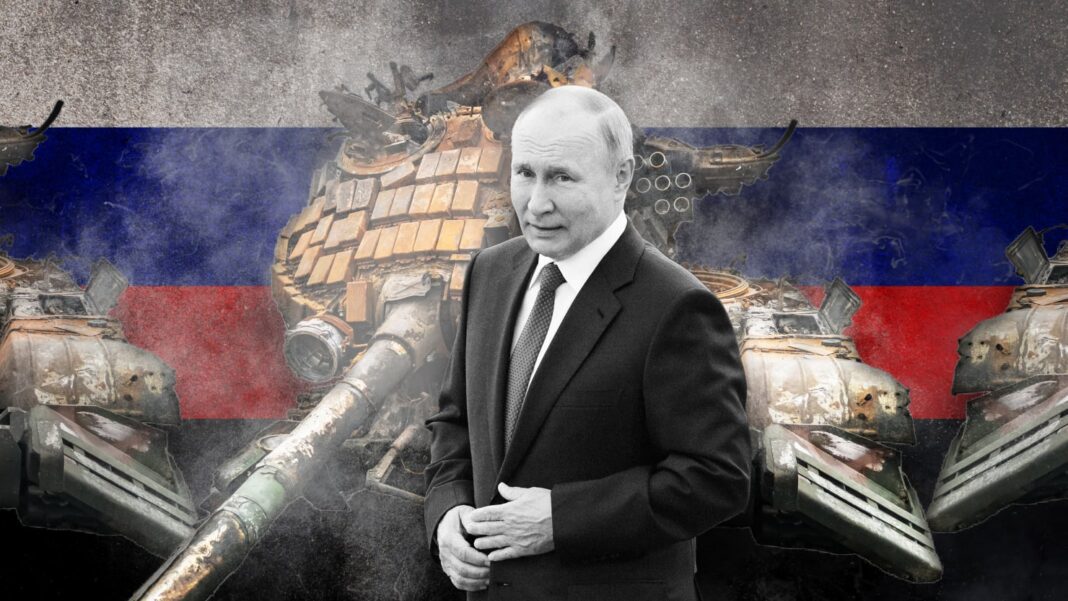Biography :
The current President of Russia, Vladimir Putin, will participate in the elections for the post of head of state in March 2024 as a self-nominated candidate. By law, such candidates need to collect at least 300 thousand signatures in their support by January 31, but by the 12th, Putin had collected more than 1.8 million signatures. If he wins, he will lead the country for the fifth time: he previously won elections in 2000, 2004, 2012 and 2018. Vladimir Vladimirovich Putin was born on October 7, 1952 in Leningrad (now St. Petersburg). According to him, he grew up in a simple family that lived very modestly.
The parents of the future politician met in the Tver province during the First World War. His father’s family left Petrograd there to escape hunger. They got married when they were 17 years old, and soon returned to the Northern capital. Mother, Maria Ivanovna Shelomova, worked at the factory as a laborer. During the Great Patriotic War, it survived the siege of Leningrad (Petrograd received this name in 1924).
Father, Vladimir Spiridonovich Putin, worked at the same plant: first as a security guard, and then as a foreman. During the war, he volunteered for the front and served in the NKVD battalion, which carried out sabotage behind enemy lines. During one of the operations, he was seriously wounded in the leg, he was given second group disability and returned home. Vladimir Spiridonovich had six brothers: five did not return from the front.
Vladimir Putin was a late child: his mother was 41 years old when he was born
Putin was the third son in the family: both of his older brothers did not live to see his birth. Albert was born in the 1930s and did not survive infancy, and Victor contracted diphtheria
in 1942, when he was two years old. He couldn’t cope with the disease.
Childhood and education:
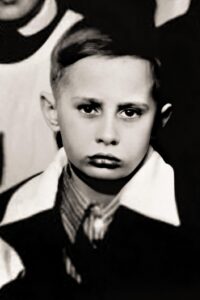
In 1960, Vladimir Putin went to school. He received his education in two stages: first, he completed eight classes at Leningrad school No. 193, and then entered a special school with a chemical focus on the basis of the Technological Institute. According to Putin, as a child he was a hooligan, not a pioneer, and could have studied better.
To be honest, until the sixth grade, I studied through the cracks.
At the same time, Putin was interested in martial arts from the age of 11: first sambo, and then judo. His mother didn’t like it until Vladimir Putin’s coach came to their home and told him what success he was able to achieve and what exactly he was doing. After this, the parents began to support the young man’s hobby.

The future president of Russia received his certificate in 1970 and immediately entered the law faculty of Leningrad State University (LSU). According to him, he went there to study in order to join the State Security Committee (KGB).
Putin said that he chose his profession in high school: to learn how to become an intelligence officer, he came to the reception room of the USSR KGB. He was advised to first obtain a law degree, which he did, graduating in 1975.
Before Putin decided to become a spy, he wanted to be a pilot, but in the end he realized that he was not interested in it
Career in the KGB:
After graduating from Leningrad State University, Putin was assigned to the KGB, where he began working in the secretariat. However, he was soon transferred to counterintelligence and sent to retraining courses for operational personnel in Leningrad and Moscow.
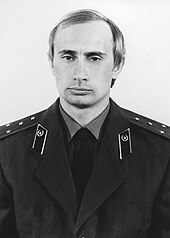
After graduating, Putin continued to work in the KGB counterintelligence, and in 1984, with the rank of Major of Justice, he went to the Red Banner Institute of the KGB of the USSR. Yu. V. Andropova. He completed a one-year foreign intelligence course and learned German in preparation for his trip to Germany.Putin left for the German Democratic Republic (GDR) in 1985. There he worked undercover for foreign intelligence of the USSR, holding the position of director of the USSR-GDR House of Friendship in Dresden.
Putin later said that his activities were connected “with illegal intelligence.” He also clarified that he was engaged in security work, “if we discard the ideological component.”
Vladimir Putin returned to the USSR in January 1990. During his service, he was promoted to lieutenant colonel, and was also awarded the bronze medal “For outstanding services to the National People’s Army of the GDR”
Arriving home, the future president refused the offer to move to the central foreign intelligence apparatus of the USSR KGB in Moscow. He decided to remain in the Leningrad department of the department, and in 1991 he completely submitted his resignation from service.
Personal life:

Vladimir Putin met his future wife Lyudmila Shkrebneva even before leaving for Germany, during a concert by Arkady Raikin. On July 28, 1983, the couple got married. Then they had two daughters. The eldest, Maria, was born in Leningrad on April 28, 1985. The youngest, Ekaterina, was already in Dresden on August 31, 1986.
Lyudmila and Vladimir Putin lived together for 30 years. The couple announced their divorce in 2013, after attending the Esmeralda ballet at the State Kremlin Palace.Putin does not share information about his personal life or the lives of his daughters. However, in 2017, during “Direct Line”, he stated that he had recently given birth to a second grandson.
Political career:
Work at the Leningrad City Hall
In February 1990, Vladimir Putin became assistant to the rector of Leningrad State University for international affairs. He said that he planned to write a Ph.D. thesis and was considering the possibility of remaining to work at the university.
However, Putin did not work at the university for long: already in May he became an adviser to the chairman of the Leningrad City Council. Leningrad State University rector Stanislav Merkuryev recommended Putin for this position to Anatoly Sobchak, who was then the chairman of the council. Putin knew Sobchak before this meeting: he lectured at Leningrad State University when the future president was studying there.
As a result, Putin was able to get a new position despite the fact that he was still serving in the KGB. According to Vladimir Putin, Sobchak was surprised to learn about this, but was not against it. The KGB also did not interfere with this work.
Putin was responsible for attracting investment into the economy of Leningrad, as well as cooperation with foreign partners and the opening of joint ventures
In June 1991, Sobchak became the first and only mayor of Leningrad: already in September the city returned its former name – St. Petersburg. After Sobchak’s appointment, Putin took over as chairman of the mayor’s office’s external relations committee.
And in August of the same year, Putin decided to leave the KGB. He later said that he made this decision during the August 1991 coup. According to him, he had to make a choice between Boris Yeltsin, who was then the president of the USSR, and the State Committee for the State of Emergency (GKChP), which included KGB Chairman Vladimir Kryuchkov.
On the one hand, I worked with Anatoly Sobchak, and he was on the side of the current government, on the side of Yeltsin, and so on. On the other hand, there was an attempt at this coup, and the security forces were on the side of those who carried it out. I couldn’t be there and there at the same time.After leaving the KGB, Putin continued to develop his political career. In 1992, he became deputy mayor, retaining his position as chairman of the external relations committee. And in 1994, when Anatoly Sobchak headed the government of St. Petersburg, Putin became his first deputy.
Work in the Russian government:
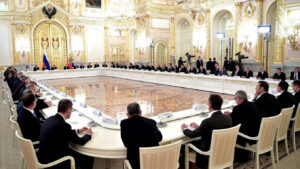
In June 1996, Anatoly Sobchak ran for a second term, but lost the election to his former deputy, Vladimir Yakovlev. As a result, Vladimir Putin left his positions. He later said that at that time he was seriously considering working as a taxi driver, because “there was nowhere to work.”
However, already in August 1996, he was offered the position of deputy manager of presidential affairs in Moscow. Putin accepted the offer and moved to the capital with his family. Since then, his political career began to develop rapidly.
Putin’s career in the second half of the 1990s:
from March 1997 – Deputy Head of the Presidential Administration and Head of the Main Control Directorate;
since May 1998 – First Deputy Head of the Presidential Administration;
since July 1998 – Director of the Federal Security Service (FSB);
from March 1999 – Secretary of the Security Council (retained the position of Director of the FSB);
since August 1999 – Chairman of the Government.
Putin took the post of Prime Minister in the context of the beginning of the counter-terrorist operation in Chechnya – the second Chechen war. In September 1999, terrorists blew up residential buildings in Moscow, Buynaksk and Volgodonsk, killing 307 people. Shortly after this, Putin gave a speech about the fight against terrorists in Chechnya that Russians remember.
We will pursue terrorists everywhere. At the airport – at the airport. So, if you’ll excuse me, we’ll catch them in the toilet, we’ll soak them in the toilet, in the end. Later, the politician admitted that he was worried about this phrase and considers it one of the most difficult moments in his career. “It’s unpleasant, I shouldn’t, having gotten to this level, talk and talk like that,” he said.
How Putin became president of Russia:
Acting President of Russia:
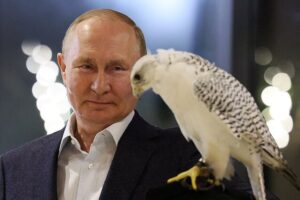
Boris Yeltsin, who was then the President of Russia, suggested that Putin take the post of Prime Minister. Back in August 1999, before his famous New Year’s address, Yeltsin called Putin his successor. In December, the head of state invited the successor to his office, where he voiced a new proposal: to become acting president.
According to Yeltsin, Putin did not immediately agree: this topic had to be discussed with him twice. During the first conversation, he refused, but two weeks later he changed his mind and accepted the offer. As Yeltsin claimed, he decided to make Putin his successor on his own, contrary to the opinions of many members of the presidential administration. He also considered Boris Nemtsov and Anatoly Chubais as possible candidates for this position.
December 31, 1999
Vladimir Putin took over as acting president of Russia
First presidential term:
On March 26, 2000, Vladimir Putin won the early Russian presidential elections with 52.94 percent of the vote.
33 people nominated themselves to participate, but the Central Election Commission registered only 12 of them. At the same time, the ballot papers contained the names of 11 candidates – five days before the elections, the former head of the KGB Moscow Directorate, Yevgeny Savostyanov, withdrew his candidacy in favor of the leader of the Yabloko party, Grigory Yavlinsky.
May 7, 2000
Vladimir Putin officially took office as President of the Russian Federation
Domestic policy:
Fight against terrorism
In 2008, Putin admitted that in the first years of his presidency, the country’s army was in a deplorable state. This was also proven by the tragedy of the sunken nuclear submarine Kursk. Despite this, the Russian army continued to fight against Chechen separatists, who at the time posed the main threat to Russia’s integrity and were responsible for many terrorist attacks in the 2000s.
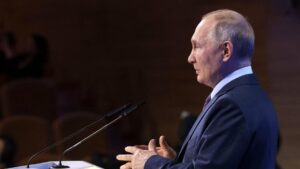
In 2002, terrorists took hostages during the musical “Nord-Ost” on Dubrovka in Moscow; 130 people became victims during the assault.
In 2002, during the celebration of May 9, a bomb exploded at the central market of Kaspiysk (Dagestan). The terrorist attack claimed the lives of 43 people.
In 2002, two trucks with explosives crashed into the Government House complex in Chechnya, killing 71 people.
In 2003, during the “Wings” rock festival, two explosions occurred at the Tushinsky airfield in Moscow, killing 15 people.
In 2003, an explosion occurred in one of the carriages of the Kislovodsk-Minvody train; 47 people did not survive it.
In 2004, an explosive device went off in a Moscow metro train car in the tunnel between the Avtozavodskaya and Paveletskaya stations. 42 people became victims.
Reforms:
Having become head of state, Vladimir Putin initiated several serious reforms, including the military. During his first presidential term, labor, urban planning, administrative, civil, the second part of the tax and other codes, and new state symbols were adopted. In addition, the regions of the country were united into federal districts, and local and regional laws began to be brought into line with federal ones.
Russians supported Putin, among other reasons, because of his openness to the people. Since 2001, the president began participating in hotlines, during which residents could ask him questions directly, as well as holding large press conferences for the media. Later, this format of communication became traditional.
United Russia Party:
The party appeared with the support of the president in December 2001. It was created on the basis of the political associations “Unity”, “Fatherland – All Russia” and “Our Home – Russia”.
“United Russia” is the largest political party in Russia, supports the policies of the president
Foreign policy:
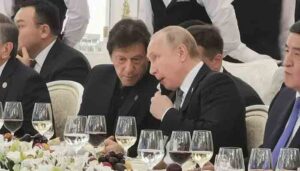
During his first term, Vladimir Putin also paid attention to foreign policy: the country strengthened relations with the United States and Europe, and also established cooperation with NATO. After the terrorist attacks in New York in September 2001, the Russian leader was the first to offer condolences to US President George W. Bush and also supported his anti-terrorist position. In addition, in 2002, the leaders signed an agreement on the reduction of strategic offensive capabilities (SORT Treaty).
Second presidential term:
On March 14, 2004, Vladimir Putin was elected President of Russia for a second term. 71.31 percent of voters voted for him. The inauguration took place on May 7, 2004.
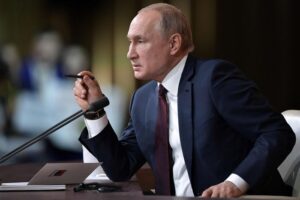
During his second term as president, Putin implemented reforms that led to increased state control over the economy and information policy, as well as a weakening of the position of the oligarchs. In addition, he proclaimed three “national projects” – overcoming poverty, modernizing the Armed Forces and housing reform.
since 2007
Maternity capital has been introduced in Russia. For the birth or adoption of a second child, women were transferred 250 thousand rubles, the amount of payments was indexed every year. By 2024, it will be 631 thousand rubles for the first child and 834 thousand for the second.
Fight against terrorism:
The fight against terrorism on Russian territory also continued. There were fewer militant attacks, but even the rarer attacks resulted in large numbers of casualties. Thus, at the end of August 2004, female suicide bombers blew up two civilian planes flying from Moscow to Volgograd and Sochi. All passengers and crew members became victims – a total of 89 people. And on September 1 of the same year, more than 30 militants seized a school in Beslan, where a festive “line-up” was taking place. The militants held 1,128 schoolchildren, their parents and school staff hostage for three days without water or food. As a result of the assault, 334 hostages, 186 of them children, did not survive.
This terrorist attack caused a number of reforms in Russia. Those who sent the bandits to commit this terrible crime aimed to set our peoples against each other, intimidate the citizens of Russia, and unleash a bloody civil strife in the North Caucasus. In this regard, I would like to say the following (…) In the near future, a set of measures will be prepared aimed at strengthening the unity of the country. One of the serious measures was the abolition of direct elections of governors in Russia.
Foreign policy:
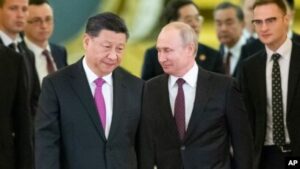
Russia’s relations with the West began to deteriorate during Putin’s second term. In February 2007, the president spoke at the Munich Security Policy Conference and criticized US foreign policy for its ideas of a unipolar world. This event went down in history as Putin’s Munich speech. 15 years later, TASS wrote that much of what the president said eventually came true. In 2007, Putin became Time magazine’s Person of the Year.
The American publication then published a long interview with the Russian leader, in which they noted Putin’s successes as head of state. At the same time, journalists noted that it would be possible to judge him as a leader only with the advent of the new decade.
Third presidential term:
In accordance with the Russian Constitution, the same person cannot hold the post of president for more than two consecutive terms. Therefore, Putin did not participate in the 2008 elections. The country’s leader was Dmitry Medvedev, the country’s first deputy prime minister, the former head of Putin’s administration, who was nominated by the United Russia, A Just Russia, Agrarian Party and Civil Power parties. 70.28 percent of voters voted for him.
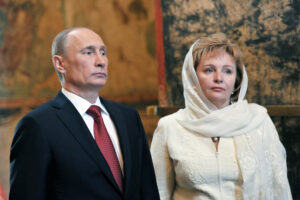
On May 8, 2008, Vladimir Putin returned to the post of Prime Minister of the Russian Federation, which he held in 1999. In addition, from 2008 to 2012 he headed United Russia. And in November 2011, the party nominated him as a candidate for the election of head of state.
On March 4, 2012, Putin was elected president of Russia for the third time, for a term of six years. The term of office increased after amendments to the Constitution in 2008. 63.60 percent of voters cast their votes for him. The inauguration took place on May 7, 2012.
Putin’s third term as president began with 11 “May decrees” – he signed them on the day he took office. The decrees were aimed at solving problems that concern Russians:
increase in salaries of public sector employees;
increasing the quality of educational, medical and social services;
improving the living conditions of Russians;
improving the work of government bodies and organizations that provide state and municipal services.
In addition, Russia has adopted a number of laws, including the “Dima Yakovlev Law” banning citizens of a number of foreign countries from adopting Russian orphans. In February 2014, Russia hosted the Winter Olympics, and in March, following the results of a referendum, Crimea and Sevastopol became part of Russia.
In people’s minds, Crimea has always been and remains an integral part of Russia. This conviction, based on truth and justice, was unshakable, passed on from generation to generation, both time and circumstances were powerless before it, all the dramatic changes that our country experienced during the twentieth century were powerless . Putin signed a corresponding decree on March 21, 2014, which sharply worsened Russia’s relations with the West and led to large-scale sanctions. At the same time, Putin’s support among Russians rose to a record 88 percent, and France-Presse named him the most influential person of the year.
During his third term as president, Vladimir Putin, at the request of the local government, decided to send the Russian military to Syria to fight terrorists. In 2017, the defeat of the militants was announced, but the Russian contingent continues to operate in Syria to this day. In addition, with the active participation of Russia in 2015, it was possible to resolve the Iranian nuclear problem.
Also in 2014–2015, the Trilateral Contact Group for resolving the situation in Donbass signed the Minsk agreements. The leaders of Russia, Ukraine, Germany and France supported them with a declaration, which they signed during a meeting in the Normandy format in Minsk.
In accordance with the Minsk agreements, Ukraine and Donbass were required to fulfill certain conditions, including:
Cease fire and withdraw troops from the line of contact.
Remove heavy weapons from the buffer zone area.
Exchange prisoners on a “all for all” basis, grant amnesty to those involved in the clashes, and begin restoring economic ties.
Ukraine was supposed to pass a law on the special status of certain areas of the Lugansk and Donetsk regions, as well as hold local elections there.
Fourth presidential term
On March 18, 2018, Vladimir Putin won the presidential election for the fourth time. He received 76.69 percent of the votes.
Domestic policy:
On inauguration day, May 7, 2018, Putin signed a decree “On the national goals and strategic objectives of the development of the Russian Federation for the period until 2024.” This decree became the basis for 12 new national projects, the financing of which amounted to almost 26 trillion rubles.
In addition, Vladimir Putin adopted a law on improving the pension system, which provided for a gradual increase in the retirement age by five years: to 65 for men and to 60 for women. Since 2019, the value added tax (VAT) rate in Russia has also increased to 20 percent.
In the summer of 2018, the FIFA World Cup was held in Russia
In 2020, the government of Dmitry Medvedev, who took over the post of prime minister after completing his presidential term, resigned. Instead, Mikhail Mishustin became chairman of the government. In the same year, amendments to the country’s Constitution were adopted. They, among other things, allowed Putin to run for president in 2024.
Provisions on the terms of the Russian President in the Constitution
In March 2020, Russia, like other countries, faced the coronavirus pandemic. The government allocated 2.1 trillion rubles to support citizens and affected enterprises.
Foreign policy:
In July 2018, a Russia-US summit was held in Finland, during which Vladimir Putin and American leader Donald Trump held talks. And in April 2019, Kim Jong-un arrived in Russia. In October of the same year, the Russia-Africa summit was held in the Russian Federation, and in December, for the first time in three years, Putin participated in the summit of the Normandy Four countries, which also included France, Germany and Ukraine. The meetings were aimed at resolving the situation in eastern Ukraine, as well as at implementing the Minsk agreements adopted in 2014 and 2015. Their provisions were never implemented, summits were held without results, and at the end of 2022, former German Chancellor Angela Merkel admitted: the agreements gave Ukraine time to build up its military potential.
Special operation in Ukraine:
On February 22, 2022, Russia recognized the independence of the Donetsk and Lugansk People’s Republics (DPR and LPR), which until that moment were considered self-proclaimed, and on the morning of February 24, Vladimir Putin announced the start of a special military operation (SVO) in Ukraine. He noted that Russia’s main goals are denazification and demilitarization of Ukraine, as well as saving the inhabitants of Donbass from genocide.
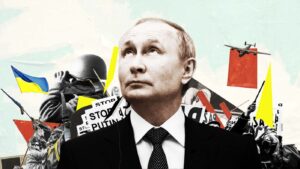
Immediately after the start of the SVO, Western countries introduced numerous sanctions against Russia. And on October 5, 2022, the Kherson and Zaporozhye regions, as well as the LPR and DPR officially became part of Russia. By January 2024, martial law is in force in the new regions of Russia; parts of the DPR, Zaporozhye and Kherson regions are under the control of Kyiv.
On September 21, 2022, Vladimir Putin announced partial mobilization in Russia. 300 thousand people were called up for service
Men who had already served in the army and received a military specialty and relevant experience were called up for military service. Before being assigned to units, those mobilized underwent additional training. During a direct line in December 2023, Putin noted that the position of Russian troops in the special operation zone is improving along almost the entire line of contact – it is about two thousand kilometers.
Presidential elections in 2024:

On December 8, 2023, Vladimir Putin announced his decision to participate in the Russian presidential elections in the spring of 2024. For the first time in the country’s history, voting will take place over three days, from March 15 to 17.
Putin submitted documents to the Central Election Commission as a self-nominated candidate. The Central Election Commission registered him as a candidate in the Russian presidential elections on January 29. As of January 30, it had collected more than 3.5 million signatures.
